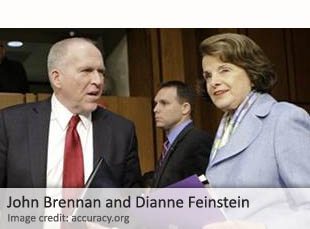Comment: The significance of the spat between Congress and the CIA
March 12, 2014 2 Comments
 By JOSEPH FITSANAKIS | intelNews.org
By JOSEPH FITSANAKIS | intelNews.org
Dianne Feinstein, the chair of the United States Senate Select Committee on Intelligence, had gone out of her way in recent days to avoid commenting on the ongoing quarrel between her Committee and the Central Intelligence Agency (CIA). That ended yesterday, when she gave a press conference accusing the CIA of illegally spying on her Committee’s Congressional staffers. Her stunning announcement came shortly after her tense meeting with the Director of the CIA, a bad-tempered John Brennan. She told the media that at the meeting she requested from Brennan an apology and acknowledgement that the alleged CIA spying was “inappropriate”. By her own account, she failed to get either, so she decided to go public. In an interview I gave yesterday to Michigan’s WILS 1230 AM’s Capital City Recap, I argued that the quarrel between the two government bodies is not in itself important. What is important, I told radio host Mike Cohen, is that the dispute has entered the public arena. A routine ‘push and shove’ mêlée has turned into an all-out fistfight in full view of the media. One Republican Senator, Lindsay Graham, told the Associated Press on Tuesday that the time had come for “the legislative branch [to] declare war on the CIA”. In response to the Committee’s accusations, the CIA has apparently instructed the Department of Justice to investigate the alleged removal by Congressional staffers of classified documents that were “protected by executive privilege [and were] beyond the scope of the Committee’s investigation”.
The “investigation” referred to by the Agency is a probe currently underway by the Senate Intelligence Committee to evaluate whether the CIA’s enhanced interrogation program delivered any significant intelligence. Most members of the Committee are convinced that no actionable intelligence was extracted from terrorism detainees through the CIA’s use of torture, and claim that the CIA intentionally misled both Congress and government officials about the usefulness of the program. According to Feinstein and others, the documents allegedly removed by Congressional staffers from a CIA facility in northern Virginia prove that the enhanced interrogation program was essentially worthless, which is why the Agency was trying to conceal them from Congressional scrutiny. But the CIA claims that too many members of Congress are more eager to maintain good relations with the media than preserve state secrets, and thus routinely resort to leaking classified material. These leaks endanger the security of the United States and compel the CIA to be economical in sharing classified with Congressional staffers.
I told host Mike Cohen that the CIA is right to be upset about the regular leaks coming from Congress. At the same time, however, I noted that it would be good to keep in mind that most members of the Senate’s Intelligence Committee remember both the Watergate Affair and the Church Committee investigations, which led to the current system of legislative oversight of the Intelligence Community. The Church Committee uncovered numerous instances of unlawful domestic intelligence programs conducted by the CIA and other agencies, which directly violated the Constitution. The Senate Intelligence Committee is determined to prevent a recurrence of the pre-Watergate domestic intelligence environment. In this sense, it is also trying to assert its bureaucratic authority over the CIA, with the current dispute serving as a perfect vehicle with which to do so.
Who is going to win this row? In my interview I opined that I would not be surprised if President Barack Obama eventually stepped in to resolve the imbroglio. In the meantime, this ongoing feud is revealing some serious —perhaps even fatal— strains in the relationship between the nations’ legislative branch and the Intelligence Community. The post-Watergate system of checks and balances between America’s legislative branch and the Intelligence Community is currently facing the greatest threat in its 40-year existence.







It’s all hypocritical crap, when the average Joe citizen is spied on all is fine, let congress get spied on and suddenly Fienstein and others are all up in arms – just a bunch of crap, why was nobody worried about all the unlawful spying going on for decades, or the terror done by the “Patriot” act??
” In this sense, it is also trying to assert its bureaucratic authority over the CIA, with the current dispute serving as a perfect vehicle with which to do so.”
Bureaucratic authority?!
Congress oversees the IC via its Constitutional Authority!
The Executive branch (of which the CIA is a part) enforces our laws. The Legislative branch creates our laws. This includes the laws that regulate the CIA–including funding, mission, and more.
The Executive Orders that created the IC monster that we have today were end-arounds Congress.
Brennan’s unchecked power and arrogance are not good additions to the Constitutional balance the IC tip-toes on.